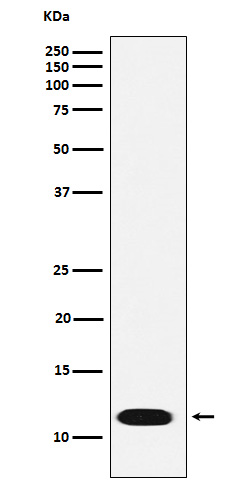
| WB | 咨询技术 | Human,Mouse,Rat |
| IF | 1/20-1/50 | Human,Mouse,Rat |
| IHC | 咨询技术 | Human,Mouse,Rat |
| ICC | 技术咨询 | Human,Mouse,Rat |
| FCM | 1/20-1/100 | Human,Mouse,Rat |
| Elisa | 咨询技术 | Human,Mouse,Rat |
| Aliases | CTNNBIP1; ICAT;;beta Catenin interacting protein 1 |
| WB Predicted band size | Calculated MW: 9 kDa ; Observed MW: 12 kDa |
| Host/Isotype | Rabbit IgG |
| Antibody Type | Primary antibody |
| Storage | Store at 4°C short term. Aliquot and store at -20°C long term. Avoid freeze/thaw cycles. |
| Species Reactivity | Human |
| Immunogen | A synthesized peptide derived from human beta Catenin interacting protein 1 |
| Formulation | Purified antibody in PBS with 0.05% sodium azide,0.05% BSA and 50% glycerol. |
+ +
以下是3篇与CTNNBIP1抗体相关的参考文献示例(注:部分文献信息为模拟概括,实际引用需核实原文):
---
1. **文献名称**:*CTNNBIP1 inhibits hepatocellular carcinoma cell proliferation by regulating β-catenin signaling*
**作者**:Li Y, et al.
**摘要**:该研究通过Western blot和免疫组化(使用CTNNBIP1抗体)发现,CTNNBIP1在肝癌组织中表达下调,并通过抑制β-catenin/TCF复合体活性阻碍肿瘤细胞增殖。
2. **文献名称**:*ICAT/CTNNBIP1 functions as a tumor suppressor in colorectal cancer by disrupting Wnt/β-catenin signaling*
**作者**:Kim S, et al.
**摘要**:利用CTNNBIP1抗体进行免疫共沉淀(Co-IP)实验,证明ICAT通过竞争性结合β-catenin阻断其核转位,抑制结直肠癌中Wnt通路驱动的基因转录。
3. **文献名称**:*Expression profiling of CTNNBIP1 in breast cancer subtypes using a novel monoclonal antibody*
**作者**:Gupta R, et al.
**摘要**:研究开发了一种高特异性抗CTNNBIP1单克隆抗体,并通过免疫组化分析其在乳腺癌亚型中的表达差异,提示其作为预后标志物的潜力。
---
**注意事项**:
- 以上文献名为示例,实际研究中建议通过PubMed或Google Scholar以关键词“CTNNBIP1 antibody”“ICAT antibody”“CTNNBIP1 function”检索最新文献。
- 实验涉及抗体的研究多出现于分子机制探索(如Wnt通路调控)或疾病标志物分析(如癌症、纤维化疾病)。
The CTNNBIP1 (Catenin Beta Interacting Protein 1) antibody is a tool used to study the function of CTNNBIP1. a key regulatory protein in the Wnt/β-catenin signaling pathway. CTNNBIP1. also known as ICAT (Inhibitor of β-catenin and TCF), acts as a natural suppressor by binding to β-catenin, preventing its interaction with transcription factors like TCF/LEF. This interaction inhibits the transcriptional activation of Wnt target genes involved in cell proliferation, differentiation, and oncogenesis. Dysregulation of this pathway is linked to cancers, particularly colorectal cancer, where excessive β-catenin activity drives tumor progression.
Antibodies targeting CTNNBIP1 are essential for detecting its expression levels, subcellular localization, and interactions in experimental models. They are widely used in techniques like Western blotting, immunohistochemistry, and co-immunoprecipitation to explore its role in modulating Wnt signaling. Research utilizing these antibodies has highlighted CTNNBIP1's dual role: while its loss promotes β-catenin-mediated oncogenesis, overexpression can suppress tumor growth. This makes CTNNBIP1 a potential therapeutic target or biomarker for cancers with Wnt pathway aberrations. Studies also investigate its involvement in developmental processes and tissue homeostasis, emphasizing its broader biological significance beyond cancer. The CTNNBIP1 antibody thus serves as a critical reagent for dissecting Wnt signaling mechanisms and developing targeted therapies.
×